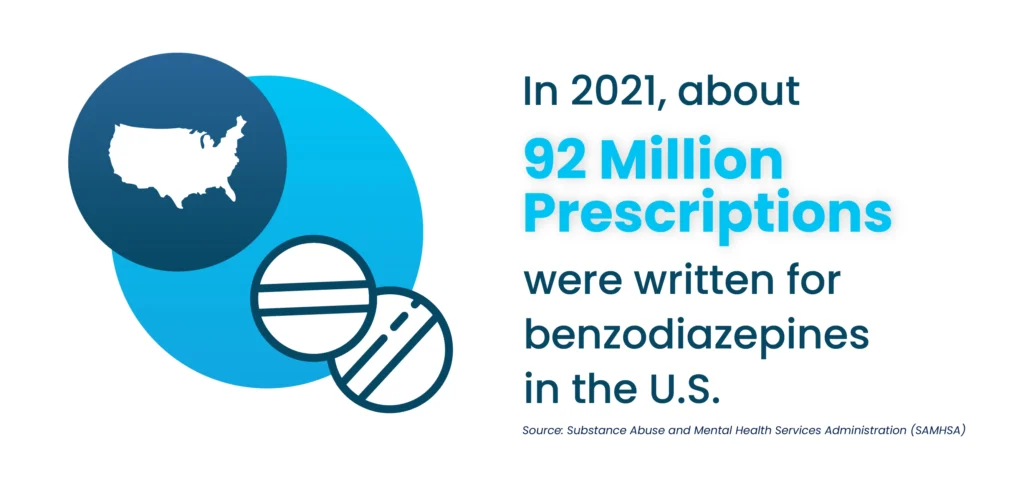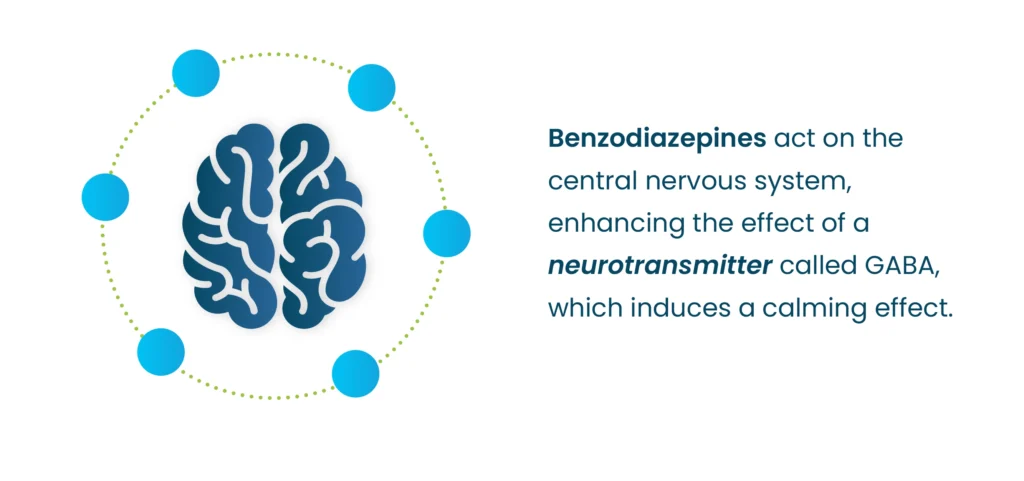Benzodiazepine Addiction Treatment
While drugs like Benzodiazepine can provide relief, long-term use or misuse often leads to dependency, making it challenging to quit without support. Understanding treatment options is essential for a successful recovery.
This guide provides an overview of practical approaches to treating benzodiazepine addiction. From medical detox and therapy to support networks, each step plays a vital role in helping individuals regain control of their lives.
Overview Of Benzodiazepine Addiction
Benzodiazepines are prescription drugs often used to relieve anxiety, insomnia, panic attacks, and seizures. While they can be helpful, misuse can quickly lead to addiction. These drugs affect the brain, creating a sense of calm that can become hard to live without.
Benzodiazepine addiction is more common than many realize. Due to frequent use, people may build a tolerance, needing higher doses to feel the same effect. This dependence can quickly turn into an addiction, affecting people of all ages.
The impact of benzodiazepine misuse is profound. It can harm mental health conditions like worsening anxiety and strain relationships. Over time, addiction can lead to physical health problems, including memory loss and weakened cognitive function.

Identifying Benzodiazepine Addiction
Identifying Benzo’s addiction early can help in finding the proper support. Recognizing signs and symptoms is essential for timely intervention.
Common Signs And Symptoms
Identifying benzodiazepine addiction is the first step toward a healthier future. Seeking help can provide the support and resources needed for lasting recovery. Here are some of the common signs:
- Increased drowsiness and confusion
- Trouble focusing or memory issues
- Mood swings and irritability
- Slurred speech or difficulty articulating thoughts
- Reduced coordination or difficulty with motor skills
- Frequent dizziness or lightheadedness
- Intense cravings for the drug
- Social withdrawal or isolation from friends and family
Recognizing these signs can guide you toward seeking help and a path to recovery.
Causes And Risk Factors
Several factors contribute to benzodiazepine addiction. Regular use, genetic tendencies, or pre-existing mental health issues can increase risk. Misuse of benzodiazepines prescription or self-medicating can also raise the likelihood of dependence.
Diagnosis And Assessment Methods
Doctors diagnose Benzo’s use addiction by examining physical symptoms, mental health evaluations, and personal history. They may ask about prescription medication use and its impact on daily life to create a precise treatment plan.
Treatment Approaches For Benzodiazepine Addiction
Effective treatment for benzodiazepine dependence includes medical and therapeutic support to ensure safe recovery and lasting results. Combining various approaches helps young adults rebuild their lives and develop healthier coping strategies.
Detoxification And Medical Stabilization
Detox helps remove benzodiazepines from the body under medical supervision. This approach manages withdrawal symptoms and stabilizes health, making it a vital first step toward recovery. By providing a safe environment, detox prepares individuals for the next phase of their treatment journey.
Behavioral Therapies
Therapies like cognitive-behavioral therapy (CBT), motivational interviewing (MI), and contingency management (CM) help change thoughts and behaviors around drug use. These therapies support individuals in building healthier coping strategies. By addressing the underlying issues related to addiction, they empower individuals to make lasting changes in their lives.
Medications Used In Treatment
Treatment often involves tapering benzodiazepines to reduce dependence safely. Doctors may use alternative medications to ease withdrawal symptoms and help manage anxiety during the recovery process. This medication-assisted approach enhances comfort and increases the chances of successful long-term recovery.
The Role Of Support In Recovery
Support plays a crucial role in successful recovery from benzodiazepine use disorder, providing encouragement and understanding throughout the process. It creates a network of accountability, helping individuals stay committed to their recovery goals and reinforcing their progress.
Support Groups And Peer Networks
Support groups and peer networks connect individuals with others who understand their journey. Sharing experiences and learning from others in group therapy sessions can strengthen motivation, reduce isolation, and offer a sense of community. These connections and peer support provide valuable insights and foster friendships vital for recovery.
Family Involvement In Recovery
Family involvement is vital in recovery, as loved ones can provide emotional support and stability. When family members engage in the process, they help create a positive environment that encourages lasting change. This active participation can strengthen relationships and foster open communication, essential for overcoming challenges.
Building A Supportive Environment
A supportive environment promotes recovery by removing triggers and building healthy routines. This includes creating spaces encouraging self-care and connecting with people to promote positive growth. Establishing boundaries and engaging in positive activities can enhance well-being and resilience throughout recovery.

Challenges In Benzodiazepine Addiction Treatment
Benzodiazepine drug addiction treatment comes with unique challenges that require careful management for lasting recovery. Overcoming these obstacles is essential to achieving long-term success and improving overall quality of life.
Managing Withdrawal Symptoms
Benzodiazepine withdrawal symptoms can be intense, including anxiety, panic disorder, sleep issues, and irritability. Medical supervision and gradual reduction help ease these symptoms, making the process safer and more manageable. A supportive environment can significantly contribute to reducing the discomfort associated with withdrawal.
Addressing Co-Occurring Disorders
Many people with benzodiazepine addiction also face mental health issues like anxiety or depression. Treating these co-occurring disorders alongside addiction is crucial for a well-rounded and effective recovery. Integrated treatment plans can lead to better outcomes and improved emotional well-being.
Preventing Relapse
Preventing relapse involves building strong coping skills and support networks. Therapy and ongoing counseling can help individuals recognize triggers and maintain healthy habits, lowering the risk of returning to substance use disorders. Continuous support is vital in reinforcing commitment to recovery and personal growth.
Long-Term Recovery And Aftercare
Achieving long-term recovery from benzodiazepine addiction requires ongoing effort and support to maintain progress and prevent relapse. A strong aftercare plan can enhance resilience and provide essential resources for individuals navigating their recovery journey.
Developing Healthy Coping Mechanisms
Building healthy coping mechanisms is essential for managing stress and avoiding triggers. Techniques like mindfulness, exercise, and journaling can help individuals deal with challenges positively and support their recovery. These skills empower individuals to handle life’s difficulties without resorting to substance use.
Lifelong Monitoring And Support
Lifelong monitoring and support are crucial in maintaining recovery. Regular check-ins with healthcare providers and participation in support groups can help individuals stay accountable and address any emerging issues quickly. This ongoing support fosters a sense of community and encourages continued personal growth.
The Importance Of Continuing Care
Continuing care is vital for lasting recovery. Ongoing therapy and support programs provide individuals with tools to navigate life’s ups and downs while reinforcing their commitment to a drug-free life. Establishing a solid support network can significantly enhance the effectiveness of continuing care efforts.
Frequently Asked Questions (FAQs)
What medication is used for benzodiazepine cravings?
Medications commonly used to help manage benzodiazepine cravings include antidepressants, such as selective serotonin reuptake inhibitors (SSRIs) and certain anticonvulsants. These medications can reduce anxiety and mood swings, making it easier to cope with cravings. Healthcare providers often tailor treatment plans based on individual unique needs for the best results.
In some cases, doctors and healthcare professionals may prescribe a gradual tapering plan using a longer-acting benzodiazepine. This method helps to minimize withdrawal symptoms and cravings as the body adjusts. Always consult addiction experts before starting any medication to ensure it’s safe and effective for your situation.
What happens when you are addicted to benzodiazepines?
When you are addicted to benzodiazepines, your body develops a tolerance, meaning you need more of the drug to feel the same effects. This can lead to increased use and dependence, making it hard to stop without help. You may experience intense withdrawal symptoms when you try to quit, such as insomnia and anxiety disorder.
Addiction can also impact your daily life, affecting relationships, work, and overall health. Mental clarity may decline, and you might struggle with memory or decision-making. Seeking professional help is crucial to address both the addiction and its underlying causes for successful recovery.
What is the addiction rate for benzodiazepines?
The addiction rate for benzodiazepines varies but is estimated to be between 10% and 30% among individuals who use them long-term. Factors like high dosage, duration of use, and personal history can influence this rate. Those with a history of substance abuse or mental health disorders are at higher risk for developing an addiction.
Long-term use of benzodiazepines increases the likelihood of developing tolerance and dependence, making it challenging to stop without professional help. Understanding the risks associated with benzodiazepines is essential for safe use. If you or someone you know is struggling, seeking help from a healthcare provider is crucial.
What types of treatment options are available for benzodiazepine addiction?
Several effective treatment options are available for benzodiazepine addiction. Detoxification is often the first step, allowing the body to withdraw from the drug under medical supervision safely. Behavioral therapies, such as cognitive-behavioral therapy (CBT), help individuals change harmful thought patterns and develop healthy coping skills.
Medications may also be prescribed to ease withdrawal symptoms and cravings. Support groups provide a sense of community and shared experiences, reinforcing recovery. Additionally, residential and outpatient programs offer varying levels of care depending on individual needs. Combining these comprehensive approaches can lead to a successful recovery and a healthier, drug-free life.
Embrace Recovery With The Haven Detox-Arizona
If you’re struggling with benzodiazepine addiction, help is within reach. At The Haven Detox-Arizona, we offer a safe, supportive space to overcome addiction through tailored care.
Our medical detox program eases withdrawal symptoms under professional supervision, ensuring a smooth start to recovery. Residential treatment provides a structured, immersive environment focused entirely on your well-being and recovery. Our dedicated team of experts brings compassion and expertise to support every step of your journey.
Call us today at (520) 525-1252 to begin your path to a healthier, drug-free life.







